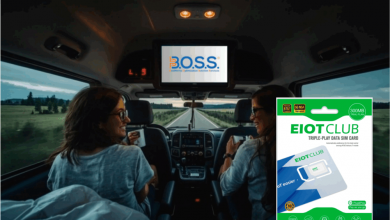How New York's Ground Transportation Industry is Using Technology to Transform the Corporate Travel Experience
The corporate travel landscape in New York City has undergone a dramatic transformation over the past decade, with technology playing an increasingly central role in how businesses manage executive transportation. As companies continue to prioritize efficiency, reliability, and seamless experiences for their teams and clients, traditional ground transportation providers are being forced to evolve—or risk becoming obsolete.
For decades, corporate transportation in major metropolitan areas operated on a relatively simple model: phone reservations, handwritten dispatch logs, and cash transactions. But the rise of ride-hailing apps like Uber and Lyft disrupted the industry, forcing traditional providers to modernize their operations or lose market share to tech-forward competitors. Today, the most successful transportation companies aren’t just keeping pace with technological change—they’re leading it.
The Digital Transformation of Fleet Management
One of the most significant technological advancements in the ground transportation sector has been the implementation of sophisticated fleet management systems. Modern providers now utilize GPS tracking, real-time traffic analysis, and predictive maintenance algorithms to optimize their operations in ways that were unimaginable just a few years ago.
These systems allow companies to monitor vehicle locations in real-time, automatically route drivers around traffic congestion, and predict mechanical issues before they result in breakdowns. For corporate clients, this translates directly into improved reliability and reduced wait times—critical factors when executives are rushing to catch flights or arrive at important meetings on schedule.
The integration of artificial intelligence into dispatch operations has further enhanced efficiency. Machine learning algorithms can now analyze historical booking patterns, predict demand fluctuations, and optimize driver assignments to minimize response times. During peak travel periods, such as morning airport runs or major corporate events, these systems ensure that resources are allocated where they’re needed most.
Elevating the Client Experience Through Technology
Beyond backend operations, technology has fundamentally changed how clients interact with transportation providers. Modern booking platforms now offer features that rival or exceed those provided by consumer ride-hailing apps, while maintaining the premium service standards that corporate clients expect.
Mobile applications allow travelers to book rides with just a few taps, track their driver’s location in real-time, and receive automated notifications about pickup times. Integration with corporate travel management systems enables seamless expense reporting, with detailed receipts automatically generated and sent to accounting departments. For companies managing transportation for multiple executives or coordinating group travel, these digital tools have eliminated much of the administrative burden that previously consumed hours of assistant time.
Payment processing has also been revolutionized through technology. Corporate clients can now establish house accounts with automated billing, eliminating the need for individual payment transactions. Digital payment systems support everything from corporate credit cards to cryptocurrency, providing flexibility for international clients and tech-forward companies.
The emergence of comprehensive car service in NYC platforms has made it easier than ever for businesses to manage their ground transportation needs through centralized systems that integrate with existing corporate infrastructure.
Specialized Vehicles Meeting Modern Business Needs
As corporate needs have evolved, so too have the vehicles being deployed for executive transportation. While traditional black sedans remain popular for individual executives, there’s been explosive growth in demand for vehicles that can accommodate team travel while maintaining a premium experience.
The rise of luxury Sprinter van services exemplifies this trend. These high-end vehicles, typically based on Mercedes-Benz Sprinter platforms, offer the interior amenities of a private jet—including leather seating, WiFi connectivity, privacy partitions, and multimedia entertainment systems—while accommodating 8-14 passengers. For companies coordinating group travel to corporate events, client meetings, or airport transfers, these vehicles provide an elegant solution that keeps teams together while maintaining productivity during transit.
Technology has also enhanced the in-vehicle experience. Modern executive vehicles are equipped with mobile hotspots, wireless charging stations, and integrated audio-visual systems that allow passengers to conduct video conferences, review presentations, or simply remain connected during their journey. For executives who treat travel time as productive work time, these amenities are no longer luxuries—they’re necessities.
Data Analytics Driving Business Intelligence
Perhaps the most transformative aspect of technology in corporate transportation is the wealth of data now available to both providers and clients. Modern transportation management systems capture detailed information about every trip, creating valuable datasets that can be analyzed to optimize future operations.
Corporate clients can access dashboards showing spending patterns, frequently used routes, peak travel times, and driver performance metrics. This business intelligence enables companies to negotiate better rates, identify cost-saving opportunities, and ensure their transportation spending aligns with actual business needs.
For transportation providers, data analytics has become essential for competitive differentiation. By analyzing customer behavior patterns, providers can anticipate needs, personalize service offerings, and proactively address potential issues before they impact the client experience. Predictive analytics can identify when a long-time client’s booking patterns change, triggering outreach to ensure satisfaction and prevent churn.
Sustainability and Corporate Responsibility
Technology is also enabling ground transportation providers to address growing corporate demands for environmental sustainability. Electric and hybrid vehicles are becoming more common in luxury fleets, with sophisticated charging infrastructure and route planning software ensuring that eco-friendly options don’t compromise service quality.
Carbon tracking features now allow corporate clients to monitor the environmental impact of their ground transportation spending, supporting broader ESG (Environmental, Social, and Governance) initiatives. Some providers offer carbon offset programs integrated directly into their billing systems, making it simple for companies to neutralize the environmental impact of business travel.
The Integration of Executive Ground Transportation Ecosystems
The most sophisticated corporate transportation solutions now function as comprehensive ecosystems rather than isolated services. Executive ground transportation platforms integrate with corporate calendars, travel management systems, security protocols, and expense reporting tools to create seamless experiences that require minimal manual intervention.
For companies with complex travel needs—such as coordinating transportation for multiple executives across different cities or managing logistics for large corporate events—these integrated systems have become indispensable. Automated workflows can trigger transportation bookings based on flight confirmations, adjust pickup times based on real-time flight tracking, and reroute vehicles automatically when schedules change.
Looking Ahead: The Future of Corporate Transportation Technology
As we look toward the future, several emerging technologies promise to further transform the corporate ground transportation landscape. Autonomous vehicles, while still years away from widespread commercial deployment, could eventually reduce costs while improving safety. Advanced biometric security systems may streamline passenger verification and enhance safety protocols. And the continued evolution of AI and machine learning will enable even more sophisticated personalization and predictive capabilities.
The companies that will thrive in this evolving landscape are those that view technology not as a replacement for personal service, but as an enabler of exceptional experiences. The most successful providers combine cutting-edge technology with the human touch that corporate clients value—using digital tools to eliminate friction and enhance reliability while maintaining the premium, personalized service that distinguishes executive transportation from commodity ride-hailing.
For businesses navigating the complexities of corporate travel in major metropolitan markets, the message is clear: the future of ground transportation is here, and it’s being driven by the seamless integration of technology and service excellence.





